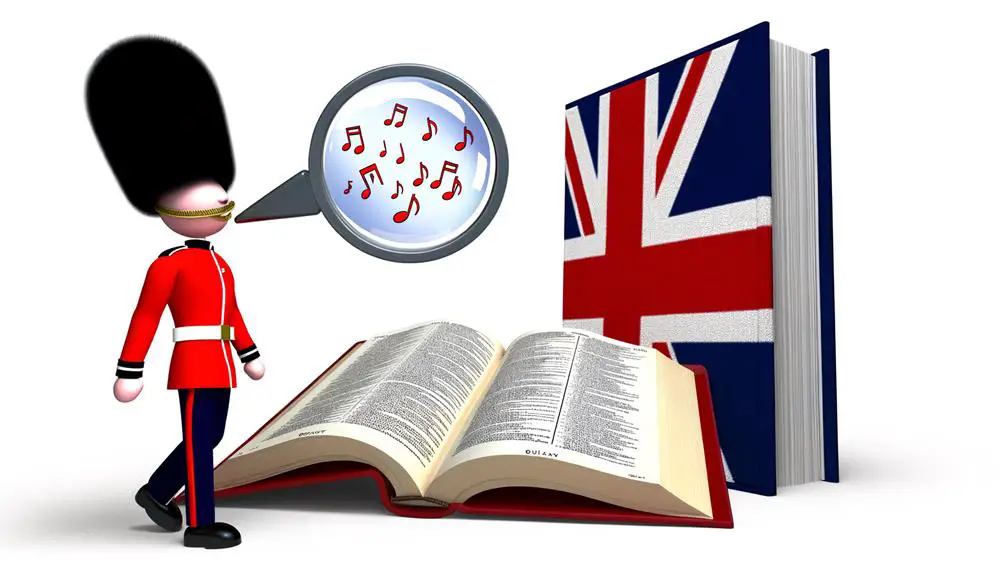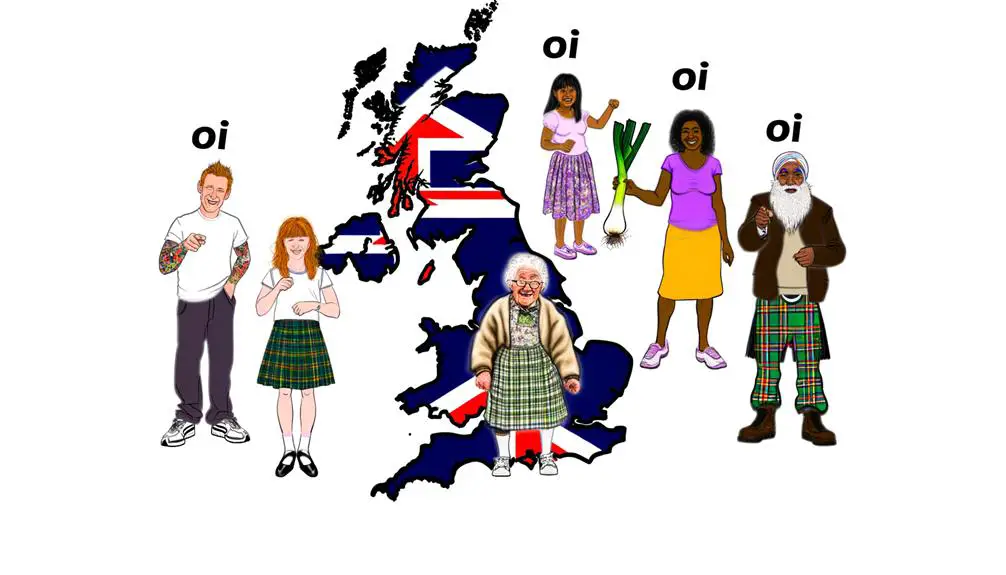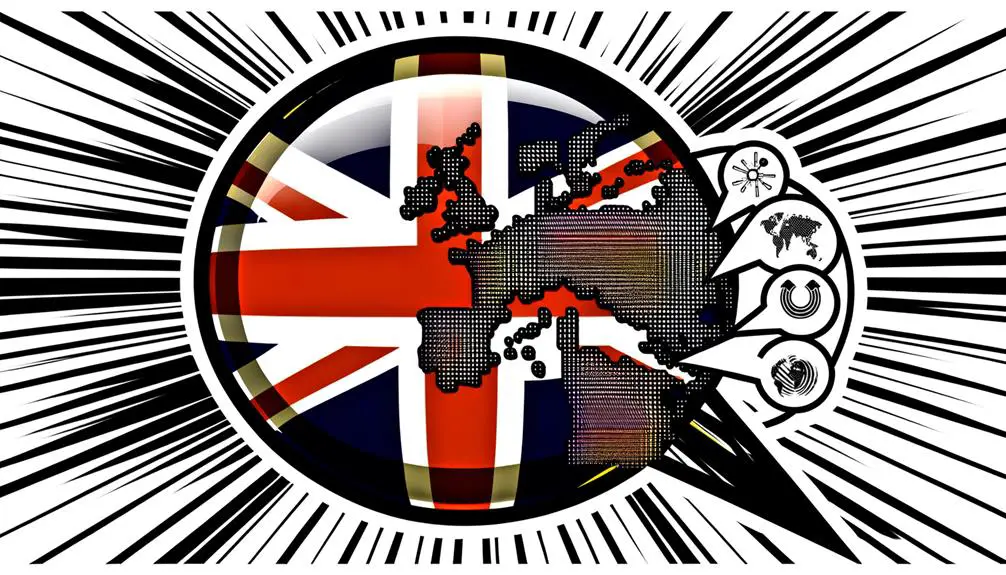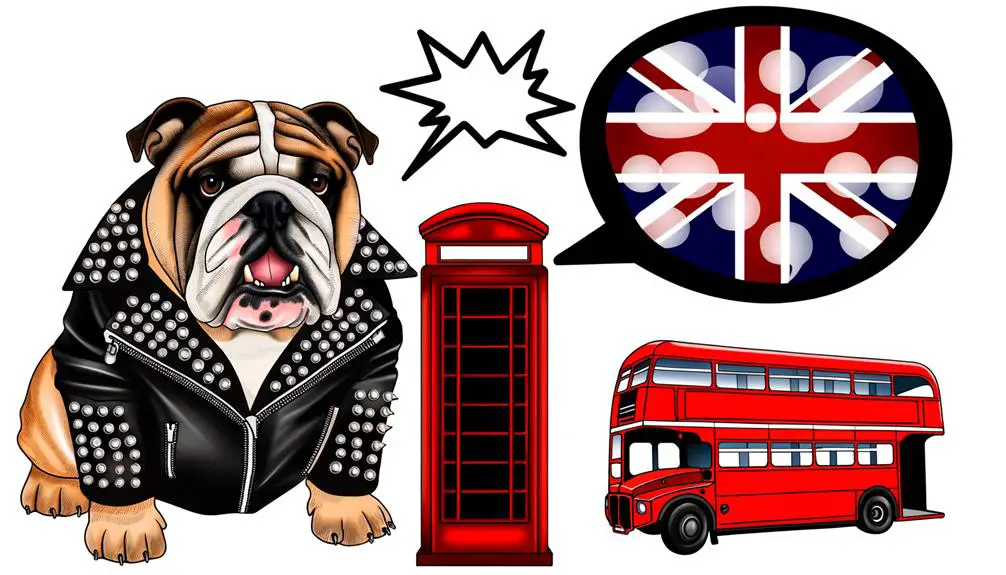You're delving into 'Oi,' a term deeply entrenched in British working-class culture. Originating as a casual call for attention, similar to 'hey,' its roots may link to the nautical 'hoi.' Over time, 'Oi' has transformed into a symbol of defiance and unity, particularly post-war, and it's been adopted by various subcultures, each infusing it with unique connotations of collective experience and struggle. Its pronunciation is nuanced by regional accents, revealing the complexities of British vernacular speech. 'Oi' carries distinct meanings across Britain's regions, reflecting the intricate landscape of local identities. As you explore further, you'll uncover even more about its role in expressing camaraderie, challenge, and directness.
Key Takeaways
- 'Oi' is a British slang term used to grab someone's attention or express surprise.
- It originated in British working-class culture as a form of informal communication.
- The term reflects camaraderie, defiance, and is often used in casual conversations.
- Its usage can vary by context, being acceptable in informal settings but considered impolite in formal ones.
- 'Oi' has been adopted globally, with nuances in meaning and usage across different cultures.
The Origins of 'Oi'

Tracing the origins of 'Oi' reveals a complex tapestry of linguistic evolution, deeply embedded within British working-class culture. You'll find that 'Oi etymology' traverses a path marked by socio-political shifts and a vivid colloquial landscape. Initially, 'Oi' served as an informal means of attracting attention, akin to 'hey' or 'hoi,' with its roots possibly lying in the latter, a term of nautical origin. This historical context underscores the term's evolution from a simple interjection to a multifaceted expression of identity and resistance.
Delving further into 'Oi etymology,' you encounter its transformation during the 20th century, particularly within the socio-economic upheavals that characterized post-war Britain. Here, 'Oi' morphed from a mere exclamation into a symbol of working-class defiance and solidarity. This period saw the term being co-opted by various subcultures, each infusing 'Oi' with nuances reflective of their collective experiences and struggles. The resilience and adaptability of 'Oi' within these communities underscore its significance beyond mere vocabulary, embodying a spirit of rebellion and camaraderie.
Moreover, examining 'Oi' within its historical context, you grasp its role as a linguistic mirror to the societal changes sweeping through Britain. From the docks to the streets, 'Oi's' journey is a proof to the enduring power of language as both a tool for communication and an instrument for cultural expression. Through this lens, 'Oi' emerges not just as a word but as a living, breathing entity, continuously shaped by the hands of history and the voices of the people.
Pronunciation and Spelling

You must understand that mastering the accurate pronunciation of 'Oi' is pivotal for authentic British communication. The emphasis lies on the monophthongal sound, often nuanced by regional accents.
Exploring spelling variations reveals a consistency in representation, yet underscores the adaptability of slang in written forms.
This analysis not only enhances your linguistic accuracy but also deepens your appreciation of the intricacies within British vernacular speech.
Correct Pronunciation Guide
To properly enunciate 'Oi' in British slang, it's essential to emphasize the diphthong, blending the sounds of 'o' as in 'cot' and a short 'i' as in 'bit'. This combination creates a unique sound characteristic of British English, setting it apart from other variants.
The vowel sounds play a pivotal role in achieving the authentic pronunciation. Specifically, the shift between the two vowel sounds should be smooth yet distinct, capturing the essence of the diphthong.
Additionally, intonation patterns contribute greatly to conveying the intended meaning, whether it's a call for attention or an expression of surprise. A slight rise in pitch towards the end of the word can indicate a question or an increased emphasis, enriching the linguistic texture of 'Oi'.
Spelling Variations Explored
Exploring the spelling variations of 'Oi' in British slang reveals a fascinating intersection between pronunciation and orthographic representation, highlighting how linguistic nuances are captured in written form. You'll find that common misspellings often stem from attempts to phonetically transcribe the sound, which can vary based on regional accents. The historical roots of 'Oi' trace back to a complex interplay of language evolution and social context, shaping its spelling and usage over time.
| Variation | Commonality | Notes |
|---|---|---|
| Oi | Most common | Standard spelling |
| Oy | Less common | Reflects alternative pronunciation |
| Oigh | Rare | Attempt at phonetic spelling |
| Oi' | Uncommon | Indicates a glottal stop |
| Oye | Rare | Influenced by Spanish 'Oye' |
This table illustrates the diversity in spelling, each variation shedding light on the rich tapestry of British linguistic identity.
'Oi' in Everyday Language

Commonly heard in the streets and pubs of Britain, 'oi' serves as a versatile interjection, capturing attention or expressing a range of emotions from surprise to annoyance. The usage frequency of 'oi' in everyday language underscores its deeply ingrained position within British culture. It isn't merely a word but a linguistic tool that reflects the dynamic interplay between language, identity, and social interaction.
Analyzing 'oi' from a scholarly perspective, one notices its cultural significance transcends its apparent simplicity. This exclamation, often perceived as brusque or informal, facilitates a myriad of social interactions, from beckoning someone to expressing disapproval. Its prevalence across various contexts—from casual conversations among friends to more heated exchanges in public spaces—illustrates its adaptability and the nuanced understanding required to interpret its meaning correctly within a given situation.
Moreover, the application of 'oi' reveals much about the speaker's intentions and the nature of the interpersonal relationship involved. Its use can denote familiarity and camaraderie or, conversely, signal a breach of social etiquette, depending on the tone and context. This dual capacity to convey solidarity or social discord highlights the complexity of interpreting and using 'oi' effectively.
Regional Variations

You'll find that the expression 'Oi' carries distinct nuances across Britain's regions, reflecting the country's complex linguistic landscape.
Geographic slang differences highlight how local identity and cultural contexts shape the usage and interpretation of this seemingly simple interjection.
Examining local usage nuances, then, offers a lens through which to understand broader social and linguistic dynamics at play.
Geographic Slang Differences
The use of 'oi' as slang exhibits significant regional variations across the United Kingdom, reflecting the intricate tapestry of local dialects and cultural identities.
These dialect influences aren't merely linguistic anomalies but are deeply entwined with the cultural perceptions of the regions they hail from.
In some areas, 'oi' might carry a more aggressive undertone, used to garner attention swiftly or express displeasure. Meanwhile, in other regions, it's employed in a more benign, almost affectionate manner among friends.
This variance underscores the adaptability of slang within the linguistic landscape, adapting to the nuances of regional dialects. It showcases how cultural perceptions shape the evolution and reception of slang, turning a simple exclamation into a multifaceted expression of identity.
Local Usage Nuances
Delving into the regional variations of 'oi' usage, it becomes evident that this slang term's connotations and applications markedly differ from one locality to another, reflecting the distinct social dynamics and linguistic traditions of each area. Here's how:
- Dialect Influence: In regions with a strong dialectical identity, 'oi' carries unique intonations and can signify camaraderie or challenge, depending on the context.
- Cultural Perceptions: Areas with diverse cultural backgrounds may adopt 'oi' with varying degrees of formality or informality, influenced by the local interplay of cultures.
- Frequency of Use: In some localities, 'oi' is embedded in daily language, while in others, it appears sparingly, highlighting regional linguistic preferences.
- Contextual Meaning: The surrounding words and the situation significantly affect 'oi's' interpretation, demonstrating the nuanced understanding required to navigate its use effectively across different regions.
'Oi' in Media and Music

Exploring the domain of media and music reveals how the exclamation 'Oi' transcends its colloquial roots, embedding itself as a distinctive cultural marker within various artistic expressions. This evolution isn't merely incidental but speaks volumes about the cultural and social dynamics at play within British society. The term 'Oi' has navigated its way through various stereotypes, often being associated with a working-class assertiveness or a cheeky form of attention-grabbing. When artists and celebrities incorporate 'Oi' into their performances or public shout outs, they aren't only acknowledging its deep-seated roots in British lexicon but also embracing and sometimes challenging the stereotypes associated with it.
In music, particularly within the punk and ska genres, 'Oi' has become a rallying cry, a connector of the disaffected, and a declaration of identity. Bands and musicians have used it to evoke a sense of belonging, resistance, and rebellion, tapping into the term's gritty, unapologetic connotations. The usage of 'Oi' in lyrics or band names often signifies more than a mere interjection; it embodies an attitude, a stance, or a worldview, encapsulating the essence of the music's message.
Similarly, in television and film, 'Oi' punctuates dialogues with authenticity, adding layers to character development and situational dynamics. It serves as a linguistic bridge, connecting characters with their cultural backgrounds and providing viewers with insights into the nuances of British identity.
Through these mediums, 'Oi' has been elevated from a simple exclamation to a symbol of cultural resonance, reflecting the complexities and diversities of British society.
The Attitude Behind 'Oi'

While 'Oi' may often be perceived as a simple, assertive call to attention, its underlying attitude is complex, embodying a spectrum of emotions from camaraderie to confrontational defiance. This multifaceted nature is reflective of its usage frequency and significant cultural impact, positioning 'Oi' as a linguistic tool that transcends mere vocalization to become a marker of identity and group belonging.
To understand the depth of 'Oi's meaning, consider the following:
- Usage Frequency: The prevalence of 'Oi' in daily conversations, media, and music underscores its versatility. This high usage frequency indicates not just a colloquial preference but a cultural resonance that spans across various contexts, from friendly banter to serious altercations.
- Camaraderie: In some instances, 'Oi' fosters a sense of unity and belonging. It's a call to arms among friends, a nudge to pay attention, often imbued with warmth and familiarity. This aspect highlights the term's capability to bond individuals through shared cultural understanding.
- Confrontational Defiance: Conversely, 'Oi' can signal challenge or objection, embodying a spirit of rebellion. Its sharp delivery can transform it into a verbal confrontation, demonstrating the speaker's refusal to remain passive in the face of disagreement.
- Cultural Impact: The widespread adoption and adaptation of 'Oi' across different British regions reflect its cultural significance. It's a linguistic phenomenon that captures the essence of British assertiveness and directness, influencing not just language but attitudes and behaviors.
Analyzing 'Oi' reveals its role as a cultural artifact, a demonstration of the rich tapestry of British linguistic practices. Its layered meanings, shaped by context and delivery, offer insights into the dynamics of communication and social interaction within British society.
Politeness and Usage

In evaluating the nuances of 'Oi' within the framework of British politeness and usage, it's important to think about how its deployment can either maintain or disrupt social etiquettes. You'll find that its reception varies greatly depending on the context, particularly in formal settings, where its use is often frowned upon. The understanding and interpretation of 'Oi' can greatly impact interactions, potentially leading to international misunderstandings if not used judiciously.
| Context | Acceptability | Potential for Misunderstanding |
|---|---|---|
| Casual Conversations | High | Low |
| Formal Contexts | Low | High |
| International Settings | Medium | High |
| Social Media | High | Medium |
| Public Announcements | Very Low | Very High |
In casual conversations among friends or peers, 'Oi' might serve as an effective attention-getter or a playful call. However, as you move into more formal contexts, its usage is likely to be perceived as rude or inappropriate, underscoring the importance of gauging the audience and setting. The potential for misunderstandings escalates in international settings, where the nuances of British slang are less understood. Non-British speakers might interpret 'Oi' as aggressive or disrespectful, rather than the familiar or urgent call it often signifies within the UK.
This complexity reveals a need for heightened awareness and sensitivity, especially when traversing cross-cultural communication. Understanding the multifaceted nature of 'Oi' allows you to avoid unintended offense, fostering smoother interactions in a variety of social landscapes.
Misconceptions and Clarifications

To address common misconceptions, it's important to clarify that 'Oi' isn't inherently disrespectful, but its interpretation hinges greatly on context and tone. This two-letter interjection carries a multitude of meanings and implications, deeply embedded within British linguistic practices. Its usage frequency and cultural perceptions vary greatly, sparking a need for a nuanced understanding of its role in communication.
- Contextual Sensitivity: 'Oi' can function as a friendly nudge among close acquaintances or a stern call for attention in more formal scenarios. The distinction lies in the subtleties of delivery, highlighting the importance of auditory cues in deciphering its intended message.
- Cultural Perceptions: Within the UK, 'Oi' is deeply ingrained in the social fabric, often perceived with a level of endearment when used in familiar settings. However, to outsiders or in certain contexts, it might come across as brash or impolite. This polarity underscores the complexities of cultural interpretations and the significance of understanding local customs.
- Usage Frequency: The prevalence of 'Oi' varies across regions and demographics within the UK, reflecting a tapestry of linguistic identities. Its frequency can signal social affiliations, age groups, or even regional pride, offering a lens into the dynamic nature of British slang.
- Clarification Through Usage: Ultimately, the meaning of 'Oi' is best understood through its practical application. Observing its deployment in real-life situations provides invaluable insights into its multifaceted character, bridging the gap between misconceptions and genuine comprehension.
Analyzing 'Oi' through these lenses offers a deeper appreciation of its role in British communication, challenging simplistic interpretations and encouraging a more informed engagement with linguistic diversity.
'Oi' Beyond the UK

Exploring 'Oi' beyond the borders of the UK reveals its intriguing exploration and demonstration within various global contexts. The global adoption of 'Oi' isn't just a confirmation to the mobility of language but also to the cultural impact of British media and migration patterns. As you investigate further, you'll find that 'Oi' has been integrated into the lexicons of various cultures, each adding a unique twist to its use and meaning.
| Country | Adaptation & Use |
|---|---|
| Australia | Used similarly to the UK, often in a more lighthearted manner to grab attention or express surprise. |
| Brazil | Adopted into the punk scene, 'Oi!' represents a musical genre and subculture, emphasizing its rebellious undertones. |
| Japan | Often seen in manga and anime, 'Oi' is used to attract attention, mirroring its English counterpart but injected into distinctly Japanese contexts. |
This table underscores the adaptability of 'Oi', showcasing its integration into diverse cultural settings. In Australia, 'Oi' retains much of its British casualness, underscoring the historical ties between the two countries. Conversely, in Brazil, 'Oi' takes on a subcultural identity, highlighting how global movements can reinterpret and repurpose language. In Japan, the adoption of 'Oi' into popular media like manga and anime illustrates the global reach of English slang and its incorporation into non-English speaking cultures.
Such global adoption raises questions about the dynamics of cultural exchange and the evolution of language in a globalized world. 'Oi's journey from British slang to a globally recognized expression encapsulates the complex interplay between language, culture, and identity, offering a fascinating lens through which to examine the broader impacts of linguistic globalization.
Frequently Asked Questions
How Does the Use of 'Oi' Differ Among Various Age Groups Within the Uk?
You'll find that the use of 'oi' varies greatly across different age groups in the UK, reflecting regional variations and pronunciation differences.
Younger generations often use it more casually, almost as a colloquial greeting or to grab attention, while older individuals might perceive it as rude or aggressive.
These nuances are deeply influenced by local dialects and social contexts, demonstrating the word's flexibility and the rich tapestry of British linguistic culture.
Can 'Oi' Be Considered a Term of Endearment in Specific Contexts?
Absolutely, 'oi' can morph into a term of endearment, showcasing the quirky nature of friendly banter and cultural nuances unique to the UK.
Through an analytical lens, this term embodies the essence of British camaraderie, often wrapped in a facade of mock indignation.
It's a linguistic chameleon, adapting its meaning based on context, tone, and the relationship between speaker and listener, highlighting the rich tapestry of communication styles within British society.
Are There Any Notable Legal Cases or Controversies Involving the Use of 'Oi' in Public Discourse?
You're delving into whether 'oi' has sparked legal battles or public controversies, focusing on its etymology and pronunciation.
It's important to understand that while 'oi's roots and sound might seem straightforward, its usage can complicate matters.
No specific legal cases or controversies directly link to 'oi' in a significant way, but its application in various contexts, from casual to confrontational, underscores the complexity of language in public discourse.
How Has the Digital Age and Social Media Influenced the Usage and Perception of 'Oi' Among Younger Generations?
In the digital age, you've seen 'oi' evolve due to global trends and memetic evolution. Social media platforms have amplified its use among the youth, transforming its perception from just a British exclamation to a universally recognized call for attention.
This shift illustrates how digital environments can reshape the understanding and usage of language across generations, embedding traditional expressions into global, modern contexts. It's a fascinating study in linguistic adaptation and cultural exchange.
In What Ways Have Non-English-Speaking Cultures Adopted or Adapted 'Oi,' and How Is It Perceived in Those Contexts?
You've seen 'oi' leap from British streets to global stages, thanks to music and sports. Global music influence has carried 'oi' into non-English-speaking cultures, where it's often embraced with a mix of curiosity and coolness.
At sporting events, the interaction crosses language barriers, turning 'oi' into a chant of camaraderie or challenge. Analyzing these shifts, you'll find 'oi' morphing, not just replicated, reflecting its adaptability and the universal nature of expressive slang.
Conclusion
So, you've ventured through the linguistic jungle of 'Oi,' from its cheeky origins to its spirited use in music and media.
Ironically, while you might've started thinking 'Oi' was just another rowdy call across the pub, you've now unearthed its rich tapestry in language, revealing its nuanced role in politeness, regional identity, and even rebellion.
It's a stark reminder that even the smallest word can carry a weighty cultural punch, challenging any misconceptions with scholarly finesse.
Who'd have thought, eh?







